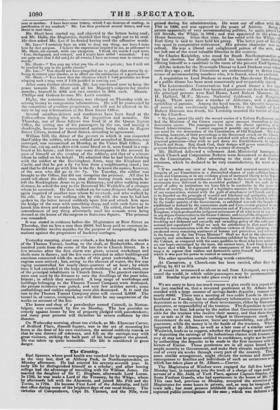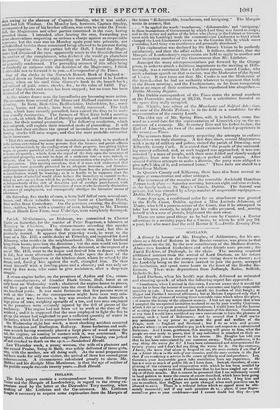We are sorry to have too much reason to give
credit to a report win Las just reached us, that a reverend gentleman at St. Albans has a sconded with a large amount of savings-banks deposits ; rumour sta nearly 8000/. There was a meeting of two noble Lords in the nag bourhood on Tuesday, but no satisfactory information was given to depositors as to the security of their investments, either by Governre guarantee, or responsibility of the trustees. The depositors in satin, banks are, we fear, led away by the notion that Government is roll° sible for the trustees who receive their money, and that their dept- are as safe as if the funds were lodged in Government stock. Government do not, however, incur any responsibility, nor afford an guarantee, while the money is in the hands of the trustees. Ulu:I happened at St. Albans, as well as a late case of a similar nature Woolwich, leads us to suggest, whether the great danger and uncertain of depositing the earnings of the indusirious classes with trustees, a. may or may not be persons entitled to confidence, might not be avoid by authorizing the deposits to be made in the first instance with lectors of Excise. Those gentlemen are in all cases bound to ample security to Government, and make their circuits regularly nt end of every six weeks through every part of the country. .11as, some similar arrangement, might obviate the serious and distresa consequence to families and individuals of such an occurrence as t which has taken place at St. Albans.—Courier. The Magistrates of Windsor were engaged for full five hours Monday last, in inquiring into the truth of a charge of rape made by servant of a Mr. Judd, of York Place, against Captain Stanley, of t Scots Fusileer Guards, who had apartments in the house of Mr. Jod This case had, previous to Monday, occupied the attention ofi Magistrates for some hours in private, and, as may be imagined, town talk ; but most persons withheld their opinion until after expected public investigation of the case ; which was deferred A it Says owing to the absence of Captain Stanley, who it was under- stood had left Windsor. On Monday last, however, Csaptain Stanley, accompanied by one of his brother officers, was seen to enter the Town- hall, the Magistrates and other parties concerned in the ease, having preceded them. I intended, ufter hearing the case, forwarding you some observations respecting so serious a charge against so respectable person ; but the case was on Monday again gone into privately, not an individual besides those concerned being allowed to be present during the investigation. As the parties left the Hall, I found the Magis- trates had dismissed the case, apparently much to the dissatisfaction of the mother of the complainant, who declared she would go elsewhere for justice. For this private proceeding on Monday, our Magistrates are generally condemned. The prevailing account of this affair being so decidedly at variance with the decision of the Magistrates, I think h advisable not to forward it to you.—Correspondent qf the nines.
One of the clerks in the Norwich Branch Bank of England w • knocked down on Saturday night, by two men, supposed to be London thieves, when on his road from Gurney's bank to the branch bark ; and robbed of gold, notes, checks, tk:c., to the value of 1431/. Pay- rent of the checks and notes has been stopped ; but no trace has been di-covered of the thieves.
As the winter draws near, the incendiaries are becoming more active. '(he accounts from several of the Home and Midland counties are very aLtining. In Kent, Berkshire, Bedfordshire, Oxfordshire, &c., many halos, barns, and stacks, have been totally consumed. The high winds, which have recently prevailed, have caused the fires to be more than usually destructive. The farmers of West Kent held a meeting last week, at which the Earl of Darnley presided, and formed an asso- ciation for their mutual protection. The following resolution, which they adopted, will explain their intended mode of proceeding. It will be seen that they attribute the spread of incendiarism to a notion that hurniug stacks will raise wages; and that the most probable corrective lies in insurance.
a That this meeting, convinced that incendiarism is mainly to be attributed to the notion entertained by many persons that the farmers and parish-officers are to be intimidated, by the conflagration of their property, into giving higher sages, or greater parochial relief, earnestly recommends the occupiers of land to imure adequately.; which, from the repeal of the duty upon the insurance of agricultural property, can now he done at a moderate rate—a rate, indeed, so moderate, that he is scarcely entitled to commiseration who neglects to adopt this precaution. This meeting considers, that if it were well understood that the tanners were generally protected by an adequate insurance, and therefore could experience only a temporary inconvenience from fire, the princi:m1 motive to incendiarisin would be wanting; as it is hardly to be supposen that the wanton desire of mischief would alone induce the incendiary to commit so dm- bolieal an act—an act from which he, perhaps, mi,ht be the principal s.:fferer ; indepeedentiv of the risk of detection and of condign punishment, with ith;ch it must be attended, the destruction of corn-stacks necessarily diminishes the sources of employment, and consequently abridges the labourers' means of subsistence."
On Saturday, five stacks of corn, a barm'half full of corn, several out- houses, and thme valuable horses, were burnt at Chartham Hatch, three miles from Canterbury. On the previous evening, the dwelling- house, stables, barn, with a quantity of corn, belonging to Mr. Thomas Gray, at Heath Row Farm, near L'abridge, were completely destroyed.





















 Previous page
Previous page